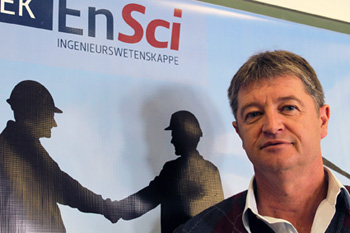Latest News Archive
Please select Category, Year, and then Month to display items
06 April 2018
Photo Rulanzen Martin
 From the left: Dr Thulisile Mphambukeli, leader of the BRICS research team that is exploring the political economy of water and food security, and her research partner, Dr Victor Okorie.
From the left: Dr Thulisile Mphambukeli, leader of the BRICS research team that is exploring the political economy of water and food security, and her research partner, Dr Victor Okorie.
A Brazil, Russia, India, China and South Africa (BRICS) delegation is to hold the 10th Annual BRICS Summit in the last week of May 2018 in Johannesburg. Dr Thulisile Mphambukeli, leader of the University of the Free State (UFS) research team alongside Dr Victor Okorie from the Department of Urban and Regional Planning, in collaboration with Prof Lere Amusan of North-West University, will ensure that water and food security is a prominent feature on the gathering’s agenda.
First, the project titled: “Exploring the political economy of water and food security nexus in BRICS and Africa” will debut at the National Institute for the Humanities and Social Sciences BRICS Think Tank Forum”.
According to Dr Mphambukeli, the key to water security is attitudinal change by means of education and conscientisation. This, she is adamant about, holds the potential to drive behavioural adjustments in the way society interacts with water.
Genetic and social approaches
Dr Okorie asserts that if strides towards reducing the demand for water were to be made, research efforts should be geared towards effecting changes at DNA level. Meaning we need to explore waterwise ways that enable crops and animals to thrive optimally.
The project also looks at social dimensions of water such as flushing a toilet. “Research activities on redesigning toilets, especially the urinal, where more than nine litres of water are used to flush less than one cubic centimetre of urine, are timely in the context of managing water and the food nexus crises,” said Dr Okorie.
Combining the genetic and social approaches would allow us to produce more with a smaller water footprint. This can be made possible by implementing precision agriculture which is about estimating and applying exact quantities of water and nutrients needed for the production of crops or the raising of livestock.
Paradigm shifting policies
Prof Amusan said the team intended to propose functional solutions that take the quality of water into consideration. Equitable production and distribution of water depends on endorsing policies of co-production between citizens, governments and the public sector. BRICS member states mutually consider water and food security as an issue of paramount significance, hence its feature on this prestigious summit’s agenda.
UFS provides an alternative route to a BEng degree
2014-06-04
 Mr Louis Lagrange Mr Louis Lagrange
Photo: Leonie Bolleurs |
The university is very excited about the establishment of a new study field at Kovsies – a BSc degree with majors in Physics and Engineering subjects. The course is presented in the Faculty of Natural and Agricultural Sciences on the Bloemfontein Campus.
Project EnSci was established at the UFS at the beginning of 2014. Twelve first-years and four second-years enrolled for the course this year.
“We replace the non-core Physics subjects with Engineering subjects. We also present all specialist Engineering subjects ourselves,” says Louis Lagrange, project manager of Projec EnSci – Engineering Science.
“There isn’t enough space at universities in South Africa to accommodate all students who are interested in engineering. The UFS course can thus be considered a fundamental engineering course. It equips a student in such a way that they will be able to specialise in various disciplines,” he says.
After completion of the three-year BSc degree at the UFS, students may choose to:
• graduate with a BSc degree majoring in Physics and Engineering subjects and enter the professional world.
• study further for an honours, master’s or doctoral degree in Physics.
• apply to register for a second degree – BEng or BScEng (for two additional years) at another university recognising the BSc degree with majors in Physics and Engineering Science. Acceptance is subject to certain requirements.
Matriculants interested in this field, must follow the application procedure of the UFS before 30 September 2014 and achieve the following in the final NSC or equivalent examination:
• an AP score of 34 or more is strongly recommended,
• cumulative AP score of 13 or more in Mathematics and Physical Science,
• completion of NBT tests and
• language of instruction – 4 or more.
These prospective students also need to complete and submit an application form. For more information contact us at engineeringsubjects@ufs.ac.za